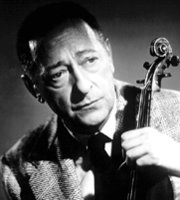Jascha Heifetz
|
|
Heifetzfront.jpg.jpeg
Jascha Heifetz (February 2, 1901 – December 10, 1987) was a violinist, often proclaimed as the greatest of all time and the most famous of the 20th century.
Heifetz was born as a Jew in Vilna in Lithuania. There is controversy over his birth year, which is sometimes put a year or two earlier (1899 or 1900). His father was the concertmaster of the Vilna Symphony Orchestra and Jascha began playing the instrument at three years old. He was a child prodigy, making his public debut at just seven years of age in Kovno (now Kaunas, Lithuania) playing the Violin Concerto by Mendelssohn. In 1910 he entered the St Petersburg conservatory to study under Leopold Auer. He played in Germany and Scandinavia at the age of twelve, meeting Fritz Kreisler for the first time in a Berlin house (this is when Kreisler, after accompanying the 12-year-old Heifetz in a performance of the Mendelssohn Concerto, said, "Now we can all break our fiddles across our knees."). Heifetz visited much of Europe while still in his teens.
His American debut came on October 27, 1917 when he played at Carnegie Hall. He stayed in the country and became an American citizen in 1925, making many public appearances and recordings. His first commercial recordings were made on November 7, 1917 and throughout his life he made recordings for RCA Victor. He had an immaculate technique and rapid finger vibrato. From time to time, his near-perfect technique and conservative stage demeanor caused some critics to accuse him of being overly mechanical, even cold. Even so, most critics agree he infused his playing with feeling and reverence for the composer's wishes.
Heifetz often enjoyed playing chamber music. His success in this field was somewhat limited, as his artistic personality tended to overwhelm his colleagues. Some notable collaborations include his 1940 recordings of trios by Beethoven, Schubert, and Brahms with cellist Emmanuel Feuermann and pianist Arthur Rubinstein as well as a later collaboration with Rubinstein and cellist Gregor Piatigorsky, with whom he recorded trios by Ravel, Tchaikovsky, and Mendelssohn.
Heifetz commissioned a number of pieces, perhaps most notably the Violin Concerto by William Walton. He also arranged a number of pieces, such as Hora Staccato by Grigoras Dinicu, a Romanian gypsy whom Heifetz is rumored to have called the greatest violinist he had ever heard. He also wrote a hit song, "When you make love to me, don't make believe", under the alias Jim Hoyl.
On his fourth tour to Israel in 1953, Heifetz included in his recitals the Violin Sonata by Richard Strauss. Strauss was considered a Nazi composer and his works were unofficially banned in Israel along with those of Richard Wagner. Despite the fact that the Holocaust had occurred less than 10 years earlier and a last-minute plea from the Israeli Minister of Education, the defiant Heifetz argued that "The music is above these factors ... I will not change my program. I have the right to decide on my repertoire." Throughout his tour the performance of the Strauss sonata was followed by dead silence and no applause.
Heifetz was attacked after his recital in Jerusalem outside his hotel by a man who struck blows to his right arm with an iron bar. As the attacker started to flee, Heifetz alerted his companions, who were armed, "Shoot that man, he tried to kill me." The assailant escaped and was never found.
The incident made headlines in the press and Heifetz defiantly announced that he would not stop playing the Strauss. More threats continued to come, however, and he omitted the Strauss from his next recital without explanation. His last concert was cancelled after his right arm began to hurt. He left Israel and did not return until 1970.
He owned both a Stradivarius and the 1740 "ex David" Guarneri del Gesù, the latter of which he preferred and kept until his death. The Guarneri is now in the San Francisco Legion of Honor museum, in accordance with Heifetz's will. His will dictates that the violin may be taken out and played "on special occasions", by deserving players.
In later years, he taught at the University of Southern California with his friend Gregor Piatigorsky. He died at the Cedar-Sinai Medical Center in Los Angeles, of heart failure.
Template:Wikiquotede:Jascha Heifetz he:יאשה חפץ ja:ヤッシャ・ハイフェッツ zh:雅沙·海飞兹

